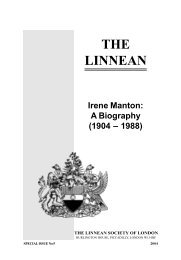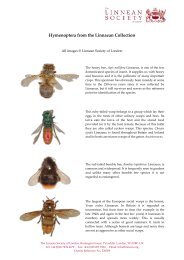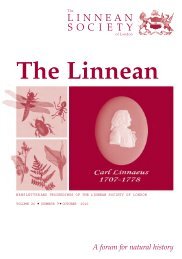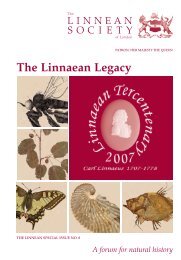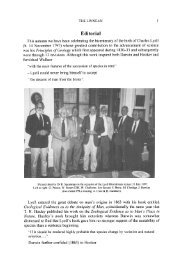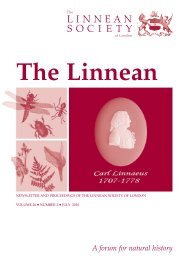Vol 25, no 3, October - The Linnean Society of London
Vol 25, no 3, October - The Linnean Society of London
Vol 25, no 3, October - The Linnean Society of London
You also want an ePaper? Increase the reach of your titles
YUMPU automatically turns print PDFs into web optimized ePapers that Google loves.
18<br />
THE LINNEAN 2009 VOLUME <strong>25</strong>(3)<br />
any cultural, ethical, or aesthetic inferiority or superiority at all. A small-scale,<br />
tech<strong>no</strong>logically ‘simple’ society that is well-adapted to existence in its environment is<br />
in scientific terms merely successful at surviving in its natural environment.<br />
Clearly however, Darwin‘s implicit view <strong>of</strong> humanity, though contradictory, rests<br />
on one conspicuous presupposition. Whether it is a cultural or biological process,<br />
humanity engages in, or can engage in, a process <strong>of</strong> ‘improvement’ <strong>of</strong> a kind which<br />
Darwin will <strong>no</strong>t build into his theory <strong>of</strong> the biological evolution <strong>of</strong> <strong>no</strong>n-human living<br />
organisms. It seems worth <strong>no</strong>ting therefore, that a presupposition <strong>of</strong> human history<br />
involving a kind <strong>of</strong> ‘linear progress’, an ideology that many have taken to result from<br />
the uncritical translation <strong>of</strong> the fully developed Darwinian theory <strong>of</strong> organic evolution<br />
onto human society – by such late nineteenth-century thinkers as Herbert Spencer for<br />
example – was evidently in Darwin’s mind well before he had made the scientific<br />
breakthrough into his theory <strong>of</strong> biological evolution.<br />
“On the east coast the natives, as we have seen, have guanaco cloaks, and on the west,<br />
they possess seal-skins. Amongst these central tribes the men generally possess an otterskin,<br />
or some small scrap about as large as a pocket-handkerchief, which is barely<br />
sufficient to cover their backs as low as their loins. It is laced across the breast by<br />
strings, and according as the wind blows, it is shifted from side to side. But these Fuegians<br />
in the ca<strong>no</strong>e were quite naked, and even one full-grown woman was absolutely so. It<br />
was raining heavily, and the fresh water, together with the spray, trickled down her body.<br />
In a<strong>no</strong>ther harbour <strong>no</strong>t far distant, a woman, who was suckling a recently-born child,<br />
came one day alongside the vessel, and remained there whilst the sleet fell and thawed<br />
on her naked bosom, and on the skin <strong>of</strong> her naked child. <strong>The</strong>se poor wretches were<br />
stunted in their growth, their hideous faces bedaubed with white paint, their skins filthy<br />
and greasy, their hair entangled, their voices discordant, their gestures violent and without<br />
dignity. Viewing such men, one can hardly make oneself believe they are fellow-creatures,<br />
and inhabitants <strong>of</strong> the same world. It is a common subject <strong>of</strong> conjecture what pleasure in<br />
life some <strong>of</strong> the less gifted animals can enjoy: how much more reasonably the same<br />
question may be asked with respect to these barbarians. At night, five or six human<br />
beings, naked and scarcely protected from the wind and rain <strong>of</strong> this tempestuous climate,<br />
sleep on the wet ground coiled up like animals. Whenever it is low water, they must rise<br />
to pick shell-fish from the rocks; and the women, winter and summer, either dive to<br />
collect sea eggs, or sit patiently in their ca<strong>no</strong>es, and, with a baited hair-line, jerk out<br />
small fish. If a seal is killed, or the floating carcass <strong>of</strong> a putrid whale discovered, it is a<br />
feast: such miserable food is assisted by a few tasteless berries and fungi. Nor are they<br />
exempt from famine, and, as a consequence, cannibalism accompanied by parricide.”<br />
Darwin seems to imply here that the ‘small scrap’ the men wear is insufficient,<br />
just as he assumes that the nakedness <strong>of</strong> other men and women is lamentable. His own<br />
morality and preconceptions prevent him from asking whether these are <strong>no</strong>t once<br />
again effective adaptations to the environment. Attitudes like these <strong>of</strong> Darwin are<br />
perfectly borne out in photographs <strong>of</strong> Yámana taken by missionaries later in the<br />
nineteenth century, in which both men and women have been coerced humiliatingly<br />
into hiding their genital regions with their hands.<br />
Yet in a climate where rain is frequent, the Yámana found that <strong>no</strong>t wearing clothes,<br />
but instead applying oil or grease to their skins, was a better form <strong>of</strong> protection. Clothes<br />
can <strong>of</strong>ten remain permanently wet when one is exposed to such an environment, whereas<br />
water ‘trickles down’ a body covered in grease.



